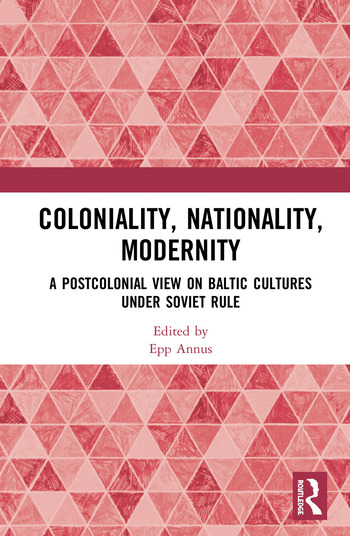London, New York : Routledge, 2018, 161 pp.
This volume addresses the Soviet era in the Baltic States from a postcolonial perspective. Our aim is to present an interdisciplinary perspective, with writings ranging from politics and economy to culture and everyday life.
Recent decades have witnessed a steady growth of interest in postcolonial studies. Postcolonial critiques developed into a major critical movement in the 1980s in the North American academy. By now, the field has developed into a comparative research area that includes scholars from all over the world. As David Moore has written, “The colonial encounters of the past two hundred years—from Dakar to Calcutta, Samarkand to Jamaica, Skopje to Tallinn, or Vladivostok to Seattle by the long route were so global and widespread, in unstandardizable diversity, that every human being and every literature on the planet today stands in relation to them: as neo-, endo- and ex-, as post- and non-.”
Interest in postcolonial approaches to the Soviet empire started to develop in the early 1990s. By now, twenty years later, scholars working with the Soviet era have generally accepted the notion of a Soviet empire. Indeed, the colonial nature of the Soviet regime is often taken for granted and many scholars from the Eastern bloc have found postcolonial categories useful in their work.
In the specific field of Baltic studies, the postcolonial turn has developed more slowly. The collection Baltic Postcolonialism (2006, ed by Violeta Kelertas) was the first volume addressing the topic. Many articles on the topic have been published in the vernacular languages, yet these are not accessible to a wider readership.
Contents:
Epp Annus
Introduction. Between arts and politics: A postcolonial view on Baltic cultures of the Soviet era.
pp 1-13
Full article
Benedikts Kalnačs
Comparing colonial differences: Baltic literary cultures as agencies of Europe’s internal others
pp 15-30
Full article
Jaak Kangilaski
Postcolonial theory as a means to understand Estonian art history
pp 31-47
Abstract
Violeta Davoliute
The Sovietization of Lithuania after WWII: modernization, transculturation, and the lettered city
pp 49-63
Maija Burima
Orientalism, otherness, and the Soviet empire: travelogues by Latvian writers of the Soviet period
pp 65-75
Abstract
Rasa Balockaite
Bourgeoisie as internal orient in the Soviet Lithuanian literature: Roses Are Red by A. Bieliauskas, 1959
pp 77-91
Sille Kapper
Post-colonial folk dancing: reflections on the impact of stage folk dance style on traditional folk dance variation in Soviet and post-Soviet Estonia
pp 93-111
Piret Peiker
Estonian nationalism through the postcolonial lens
pp 113-132
Abstract
Deniss Hanovs
Can postcolonial theory help explain Latvian politics of integration? Reflections on contemporary Latvia as a postcolonial society
pp 133-153
Abstract
